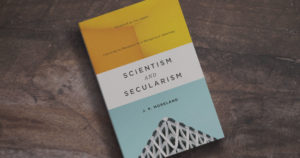Scientism and Cultural Plausibility Structures
October 6, 2018
 Because scientism is in the air we breathe, we consider it both normal and essential. Very few people are aware of what it does to a culture and to the church. It puts Christian claims outside of the “plausibility structure” (what people generally consider reasonable and rational), which has led to a number of shifts in how our culture processes reality. One of the effects of scientism, then, is making the ridicule of Christianity’s truth claims more common and acceptable (which is one of scientism’s goals). Even within the church, it has harmed our efforts to produce mature disciples of Christ among both children and adults. Let’s take these concerns one at a time.
Because scientism is in the air we breathe, we consider it both normal and essential. Very few people are aware of what it does to a culture and to the church. It puts Christian claims outside of the “plausibility structure” (what people generally consider reasonable and rational), which has led to a number of shifts in how our culture processes reality. One of the effects of scientism, then, is making the ridicule of Christianity’s truth claims more common and acceptable (which is one of scientism’s goals). Even within the church, it has harmed our efforts to produce mature disciples of Christ among both children and adults. Let’s take these concerns one at a time.
To the extent that scientism is embraced in our culture, our moral and spiritual claims will be “de-cognitivized.” In other words, our deepest beliefs about life, knowledge, history, and reality will seem to be utterly implausible—not just untrue, but unworthy of rational consideration.
The lesson here is that a culture, which has a set of background assumptions— or, a plausibility structure—sets a framework for what people think, which affects how they are willing to listen, evaluate, feel, and behave. The framework shapes what people consider plausible or implausible.
Exclusive offer for JPMoreland.com readers! 40% discount on print/ebook of Scientism and Secularism by going to crossway.org/more40 [now expires 10/31/18!]
Plausibility structures, however, are usually so widespread, and so subtle, that people typically don’t even know they are functioning. For example, we are often unaware of the ways in which some thing like music can affect how we react to a story. If you doubt this, search online for movie trailers that are edited with new music to suggest a very different genre—e.g., a heartwarming romantic comedy using creepy or foreboding music can create a structure that looks more like stalking than love. These plausibility structures may be beliefs or ideas (e.g., religious people are just superstitious; scientists are intelligent), symbols (e.g., someone wearing a white lab coat), or other elements such as music, movies, or television programs.
This can lead to problems with trusting in God. Without our being aware, we all carry with us this cultural map informed by scientism, a set of natural assumptions we make, like self-talk, default beliefs (which we naturally accept without argument), or things we’d feel embarrassed to believe (e.g., claims contrary to the authorities in our cultural map). These may lend us, then, a natural set of doubts about Christianity. People are not typically even aware of how cultural maps affect them. But even though one’s cultural map contains crucial ideas that have shaped other beliefs, when the natural assumptions are brought to our attention, we often disown them.
Download a free excerpt of the Scientism and Secularism! Help support content and leadership that advances the Christian worldview by becoming a regular financial supporter of Eidos Christian Center today!


Comment With Care